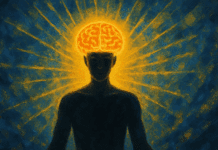Understanding Strength Beyond Muscles and Power
In an era where external accomplishments often receive more attention than internal character, the signs of a strong person are not always immediately visible. Strength, in its truest form, transcends physical might or status symbols. It manifests in mental resilience, emotional maturity, and the discipline to make difficult but necessary choices. These internal traits play a profound role in shaping mental toughness and performance under pressure, revealing an individual who remains grounded and consistent through adversity, success, and everything in between.
You may also like: The Essential Mental Shift: How to Train Your Mind to Be Stronger for Peak Performance
Strength of character, emotional intelligence, and psychological stamina often go unnoticed, yet they are the very attributes that define enduring personal power. This article explores twelve powerful signs of a strong person that offer insight into the deeper layers of human fortitude. These traits not only influence individual well-being but also shape how one navigates professional challenges, relationships, and long-term goals. Whether you are an aspiring leader, a student, or someone on a journey of personal development, understanding these attributes will offer clarity and inspiration.

Embracing Vulnerability as a Sign of Inner Strength
Vulnerability is often misunderstood as a weakness, but in reality, the ability to be vulnerable is one of the strongest qualities a person can possess. It requires a deep sense of self-awareness and the courage to reveal one’s authentic self in a world that often rewards perfection and composure. When someone chooses to be open about their emotions, failures, or insecurities, they demonstrate resilience and trust in their own worth.
This strength lies in knowing that exposure to emotional discomfort can lead to profound growth. People who embrace vulnerability invite genuine connections, foster empathy, and build trust in their relationships. They are not afraid to admit when they are wrong, ask for help, or express love and gratitude. In high-pressure environments, vulnerability enables them to adapt, learn, and recover quickly from setbacks.
Moreover, strong individuals use vulnerability strategically. They don’t share everything with everyone but discern when and how to open up. This balance between emotional exposure and discernment reflects emotional intelligence, a core component of mental toughness. Vulnerability, then, becomes not just a means of connection but a pathway to resilience, allowing individuals to experience life with depth and authenticity.

Resilience in the Face of Adversity: A Hallmark of Strength
One of the most unmistakable signs of a strong person is resilience—the capacity to recover quickly from difficulties. Resilience doesn’t mean avoiding failure or hardship; it means facing them head-on and bouncing back with greater wisdom. Resilient people do not internalize failure as a personal flaw but see it as a learning opportunity. They remain focused on their goals despite temporary setbacks.
This quality is cultivated through repeated exposure to challenges and the conscious decision to keep going. Resilience is not innate but developed through mindset, habits, and a strong sense of purpose. Strong individuals typically possess a growth mindset, believing they can improve through effort and perseverance. They take calculated risks, knowing that even failure brings valuable lessons.
In high-stakes environments such as business, academia, or competitive sports, resilience becomes a critical differentiator. While others may become paralyzed by pressure or rejection, mentally tough individuals harness adversity to fuel their determination. Their resilience is not merely about survival but about using every experience to become more capable, focused, and adaptable.

Self-Discipline: The Quiet Force Behind Mental Toughness
Self-discipline is arguably the backbone of success and one of the most telling signs of strength. It is the ability to prioritize long-term goals over immediate gratification. This quality allows strong individuals to stick to their values, routines, and commitments even when motivation wanes. They understand that discipline is not about denying pleasure but about aligning actions with purpose.
People with high levels of discipline tend to be consistent in their behavior. They show up when it’s inconvenient, persist when results are slow, and remain committed when distractions arise. This consistency builds trust—both in themselves and among those who depend on them. It is through disciplined action that they build credibility, master skills, and achieve meaningful goals.
Importantly, self-discipline also supports emotional regulation. When emotions threaten to derail decisions, disciplined individuals pause, reflect, and respond thoughtfully. This habit of emotional control strengthens their mental edge, allowing them to navigate chaos with composure. Discipline, then, is not just a productivity tool but a reflection of deep internal order and strength.
Emotional Regulation: Mastering the Inner World
Emotionally strong individuals are not devoid of emotion; rather, they have learned to regulate their responses. Emotional regulation refers to the capacity to manage intense feelings without being overwhelmed by them. It involves recognizing one’s emotional triggers, understanding the underlying causes, and choosing constructive ways to respond.
This skill is essential for mental toughness, as it prevents emotional outbursts that could sabotage relationships, decisions, or opportunities. Those who possess it remain calm under pressure, communicate with clarity, and avoid reactive behavior. Instead of suppressing their emotions, they acknowledge and process them with intention.
Emotional regulation also contributes to empathy. By understanding their own emotional landscape, strong individuals can better relate to others. They are less likely to project their feelings or judge others harshly. This creates healthier dynamics in teams, families, and communities. Ultimately, emotional regulation strengthens one’s performance by reducing mental clutter and maintaining focus on what truly matters.
Practicing Accountability Without Defensiveness
Another powerful sign of a strong person is the willingness to take full responsibility for their actions, choices, and outcomes. Accountability means owning up to mistakes, addressing shortcomings, and striving for improvement without shifting blame. This trait requires humility and courage—qualities that reflect true confidence.
When people consistently hold themselves accountable, they foster an environment of trust and integrity. Their words and actions align, and others learn to rely on them. In contrast, those who deflect responsibility often erode relationships and compromise their credibility. Strong individuals recognize that accountability is a form of self-respect as much as it is a social contract.
Accountability also empowers growth. By accepting feedback and learning from failure, strong individuals continuously refine their character and performance. They use mistakes as fuel for transformation rather than shame. This mindset not only cultivates personal excellence but also elevates the standards of those around them, creating a ripple effect of responsibility and resilience.

The Ability to Set and Uphold Boundaries
Setting healthy boundaries is a clear indicator of emotional strength and self-respect. Boundaries define what is acceptable in terms of behavior, time, energy, and emotional investment. Strong individuals understand that without boundaries, burnout, resentment, and chaos can quickly take over.
Upholding boundaries requires assertiveness, which is different from aggression. It means clearly communicating needs, saying no when necessary, and standing firm in one’s values without guilt. This ability protects their mental and emotional energy, ensuring that they can show up fully in areas that matter most.
Boundaries also serve as a filter for relationships. They reveal who respects your space and who attempts to overstep. For strong people, setting boundaries is not about control but about creating conditions for mutual respect. It reflects an understanding that you cannot pour from an empty cup, and self-preservation is not selfish—it is essential.
Compassion Without Martyrdom: Strength Through Service
Compassion is often romanticized as a soft or passive trait, but in truth, it requires immense strength to remain kind in a world that can be unkind. Strong individuals practice compassion not as an obligation but as a conscious choice. They offer support without losing themselves and empathize without enabling destructive patterns.
What differentiates their compassion is its grounded nature. They are not seeking validation through self-sacrifice, nor are they afraid to offer tough love when needed. Their kindness is informed by wisdom, boundaries, and a clear sense of purpose. They understand that true compassion often involves helping others see their own strength rather than rescuing them.
This balance allows strong individuals to be of service without becoming depleted. Their empathy is strategic, sustaining connection without compromising their own well-being. Compassion, then, becomes an active force that fosters healing, understanding, and resilience in both giver and receiver.

Integrity in Private and Public Life
Integrity is often described as doing the right thing when no one is watching. It is the alignment between values, words, and actions. One of the clearest signs of strength is living with integrity even when it is inconvenient or unrecognized. Strong individuals are guided by an internal moral compass, not external validation.
This consistency builds trust and credibility over time. Whether in leadership, friendship, or solitude, people with integrity uphold their commitments and stand by their principles. They do not compromise their ethics for temporary gain. This unwavering sense of self makes them reliable and respected across contexts.
Integrity also reinforces inner peace. When actions align with beliefs, there is less internal conflict and more clarity. Decision-making becomes easier, relationships more transparent, and life more meaningful. For those cultivating mental toughness, integrity is both a foundation and a guiding force.
Adaptability: The Willingness to Evolve
In a world of rapid change, adaptability is a defining trait of strong individuals. Rather than clinging to outdated habits or resisting change, they remain open, curious, and flexible. Adaptability involves more than external change—it reflects a mindset of lifelong learning and personal evolution.
Adaptable people do not fear the unknown; they engage with it. They ask questions, experiment with new solutions, and pivot when circumstances demand it. Their openness allows them to navigate uncertainty without losing their core identity. This fluidity enhances both personal fulfillment and professional effectiveness.
Moreover, adaptability supports resilience. When plans fall apart, adaptable individuals recalibrate without despair. They understand that evolution is not failure but progress. This mindset of continuous growth is central to developing mental edge and sustaining long-term success.
The Courage to Stand Alone When Necessary
One of the rarest but most powerful signs of a strong person is the ability to stand alone. This does not mean isolation or arrogance but the courage to uphold one’s convictions, even in the face of opposition or loneliness. Strong individuals do not compromise their values for acceptance or popularity.
This quality is especially important in ethical dilemmas or moments of transformation. When societal norms, peer pressure, or authority conflict with personal truth, strong people choose integrity over conformity. They understand that authenticity often requires solitude, and they embrace it without bitterness.
Standing alone also sharpens self-awareness. It provides space to hear one’s own voice, evaluate motives, and clarify direction. Though community and connection are vital, the ability to walk alone strengthens internal resolve and ensures that relationships are chosen, not clung to out of fear.

Strategic Optimism: Choosing Hope With Discernment
Optimism is not blind positivity; it is the deliberate decision to focus on possibilities while acknowledging reality. Strong individuals practice what can be described as strategic optimism. They recognize difficulties but choose to act from hope rather than despair. This mindset enhances creativity, motivation, and resilience.
Strategic optimism differs from denial. It does not ignore problems but insists they can be solved. This balance allows strong people to remain solution-oriented without falling into cynicism. They ask empowering questions, envision better outcomes, and take practical steps toward improvement.
Hope becomes a resource, not a fantasy. It energizes action, builds morale, and sustains long-term effort. In environments where fear or pessimism dominate, optimistic individuals often become beacons of possibility. Their attitude influences not only their own well-being but also the collective morale of teams, families, and communities.
Recognizing the Subtle Signs of a Strong Person in Everyday Life
In everyday interactions, the signs of a strong person often emerge subtly: the quiet resolve in a challenging moment, the calm response to provocation, the thoughtful pause before a difficult conversation. Strength is not always loud or visible; it is often measured by what one chooses not to say or do. It reveals itself in consistency, integrity, empathy, and clarity.
These individuals may not seek the spotlight, but their presence elevates the environments they inhabit. They create safety, inspire excellence, and challenge mediocrity by simply being who they are. Over time, their strength becomes a stabilizing force, empowering others to rise as well.
Recognizing these qualities in ourselves and others deepens our appreciation for authentic strength. It shifts our focus from appearances to essence, from outcomes to character. In doing so, we begin to cultivate the mental edge, discipline, and performance that true strength enables.
Frequently Asked Questions About the Signs of a Strong Person
What role does neuroplasticity play in mental toughness and personal strength?
Neuroplasticity refers to the brain’s ability to reorganize and form new neural connections throughout life. This biological feature is especially relevant when discussing signs of a strong person, as it underpins the ability to learn from challenges, reframe setbacks, and cultivate new habits. Strong individuals often leverage neuroplasticity by consciously engaging in practices that reshape their thought patterns—like mindfulness, goal-setting, and exposure to constructive stress. Over time, these individuals develop more adaptive mental pathways that enhance resilience and emotional regulation. In essence, personal strength is not static; it evolves as the brain evolves, allowing individuals to grow stronger through deliberate mental training and experience.
How does sleep hygiene influence emotional regulation and strength?
While not often linked directly to character development, sleep hygiene plays a crucial role in maintaining the cognitive functions that support emotional regulation. One of the more overlooked signs of strength is the ability to remain emotionally balanced in the face of disruption, which becomes significantly harder when sleep is compromised. Strong individuals often prioritize consistent sleep routines because they understand the downstream effects on focus, mood, and decision-making. Good sleep hygiene—including limiting blue light exposure, maintaining regular sleep hours, and creating a restful environment—supports the executive functioning needed for impulse control and emotional clarity. Thus, a strong person doesn’t just rely on willpower; they build a life structure that supports sustainable emotional health.
Why do strong individuals avoid toxic positivity?
Toxic positivity involves the dismissal of genuine emotions in favor of forced optimism, and strong individuals recognize it as counterproductive. One of the core signs of a strong person is the willingness to confront reality without masking discomfort. They validate their emotions and those of others, creating space for authentic processing rather than superficial platitudes. This approach fosters deeper mental resilience because it acknowledges the full spectrum of human emotion as valuable and instructive. By avoiding toxic positivity, strong people build emotional intelligence, which in turn deepens their relationships and enhances their ability to navigate adversity with authenticity.
How do strong individuals manage comparison in the age of social media?
Social media has amplified the tendency to compare oneself with others, often leading to diminished self-worth. Yet one of the key signs of strength is the ability to maintain self-defined metrics of success. Strong individuals often implement cognitive filters when engaging with online content, questioning the accuracy and intent behind what they see. They cultivate a sense of identity rooted in values rather than popularity or aesthetic appeal, allowing them to engage online without becoming emotionally compromised. Through intentional digital habits and self-reflective practices, they minimize the psychological toll of comparison and stay focused on their authentic growth.
Can strong people experience burnout, and how do they handle it?
Yes, even the strongest individuals can experience burnout, especially if they are highly driven or assume leadership roles. However, what distinguishes them is their proactive and strategic response. Recognizing burnout as a signal rather than a failure, they assess their commitments, delegate responsibilities, and reevaluate their priorities. They understand that sustainable strength involves cycles of recovery and recalibration. Moreover, they often integrate restorative practices—such as nature immersion, creative outlets, or spiritual reflection—into their routines to maintain long-term equilibrium. Managing burnout effectively is not a sign of weakness but an evolved form of strength that prioritizes longevity over short-term heroics.
Why are self-reflection and journaling considered advanced signs of strength?
Journaling and self-reflection are deeply introspective practices that require honesty, vulnerability, and intellectual curiosity. These traits align closely with the more nuanced signs of a strong person, as they demonstrate a willingness to confront one’s inner landscape without deflection. Strong individuals use these tools not merely to recount daily events, but to analyze thought patterns, track emotional triggers, and refine their decision-making frameworks. Through consistent reflection, they cultivate a deeper understanding of themselves and others, which enhances empathy and foresight. These practices signal a commitment to continuous self-improvement that is rooted in both discipline and self-compassion.
How does curiosity serve as a hidden sign of strength?
Curiosity is often undervalued in discussions about strength, yet it plays a pivotal role in sustaining mental agility and openness. One of the subtler signs of strength is the ability to ask questions even when answers may be uncomfortable or challenging. Strong individuals pursue knowledge not just to confirm what they know, but to expand their perspectives and challenge assumptions. This intellectual humility fuels innovation, fosters collaboration, and reduces defensiveness in high-stakes environments. By remaining curious, they maintain psychological flexibility—an essential component of resilience and long-term personal development.
How do strong individuals cultivate patience without becoming passive?
Patience is often mistaken for inaction, but in strong individuals, it is a strategic choice. They understand that meaningful outcomes require time, iteration, and occasional setbacks. One of the defining signs of a strong person is the ability to delay gratification while maintaining momentum. Rather than succumbing to impulsivity or frustration, they break long-term goals into actionable micro-steps that allow for steady progress. This balanced approach to patience involves both inner calm and proactive effort, reinforcing the discipline required for sustainable success.
What distinguishes the signs of strength in leadership contexts?
In leadership, the signs of strength manifest through behaviors that elevate others rather than dominate them. Strong leaders listen more than they speak, delegate effectively, and maintain composure in ambiguity. They also cultivate psychological safety, encouraging their teams to voice dissenting opinions without fear of retribution. One of the more transformative signs of a strong person in leadership is the capacity to admit mistakes publicly and learn from them. These actions build trust and loyalty, creating environments where high performance can coexist with authenticity and growth.
How can recognizing the signs of a strong person improve your relationships?
When you can identify the signs of strength in yourself and others, your relationships become more grounded, respectful, and growth-oriented. You begin to value qualities like consistency, vulnerability, and accountability over charm or charisma. This shift in perspective helps filter out relationships based on dependency or superficial attraction. Moreover, recognizing these signs encourages reciprocal behavior—you show up more authentically and invite others to do the same. Over time, this alignment creates deeper emotional intimacy, more resilient connections, and mutual respect that endures through life’s inevitable changes.
Conclusion: Cultivating the Signs of Strength for a Resilient and Purposeful Life
Understanding the signs of a strong person offers more than admiration; it provides a roadmap for personal development. Each trait discussed—vulnerability, resilience, discipline, emotional regulation, accountability, boundaries, compassion, integrity, adaptability, courage, optimism, and discernment—contributes to a life of meaning and mastery. These qualities are not reserved for a select few but are available to anyone willing to cultivate them.
In a world that often celebrates speed and spectacle, choosing to build internal strength is a revolutionary act. It demands patience, reflection, and effort—but the rewards are profound. Mental toughness and discipline are not traits we are born with but capacities we strengthen over time through intention and practice.
As you move forward, reflect on the signs of strength you already possess and the areas you wish to grow. Let this awareness guide your choices, shape your habits, and elevate your relationships. In doing so, you not only become stronger but also more compassionate, clear, and courageous—qualities that our world needs more than ever.
Further Reading:
108 — 10 Signs You’re Mentally Stronger Than You Think





